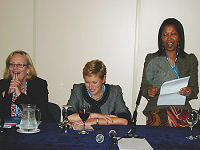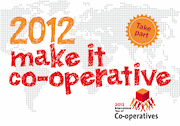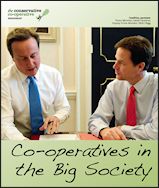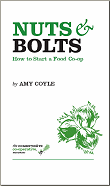C-WiSE (Conservative Women in Small Enterprises) launch
 Loanna's speech at the launch of C-WiSE (Conservative Women in Small Enterprises) at the Conservative Party Conference.
Loanna's speech at the launch of C-WiSE (Conservative Women in Small Enterprises) at the Conservative Party Conference.
I stood in the constituency of Bermondsey and Old Southwark at the last election – a seat almost surgically attached to Lib Dem incumbent, Simon Hughes. I may only have managed to remove one or two stitches, but my enthusiasm for politics as a force for good in our communities has only increased as a result of my experience.
My friend, Marjorie Ellis Thompson, recently became Chairwoman of the Conservative Co-operative Movement. I think she was disappointed that I missed out on becoming the Conservative candidate in Camberwell and Peckham, if only for the prospect of watching a scrap between the then self-appointed equalities champion, Harriet Harperson, and myself. Nevertheless, Marj clearly thought I had something to offer people – whether they want it or not - because before I realised it, I found myself a CCM Board member and Editorial Director.
The CCM was founded by Jesse Norman. He is the newly elected MP for Hereford and South Herefordshire. We believe that co-operatives are set to become an indispensable tool, for building the Big Society. And I believe that women will play an indispensible role, in the co-operative revolution. I will tell you why.
Compassionate Conservativism is the principle underpinning the Big Society. It is a school of thought that is highly compatible with, and reflective of, traditional female roles in society.
Any successful co-operative business model also relies heavily on traditional female strengths and attributes. Co-operation, collective decision-making; interdependency and community connections; flexibility and dynamism, individual autonomy and above all, a healthy dose of common sense.
It also requires freedom from the constraints of bureaucracy and hand–cuff legislation. This is being addressed by the coalition.
The co-operative business model is very flexible; it allows people to get together pool resources to own and run their own business. Like the village shop, it is a good model for local post offices, or pubs; freelancers could use this model too, form a co-operative and you never have to turn down work to pick up the children from school.
Whether it is used for profit-making purposes or for purely altruistic reasons, the co-operative business model builds and strengthens community and friendship networks. It compels those involved to consider the needs of others in its operations.
Women deliver many services offered by local authorities: Social services, childcare, education, and health. With many authorities having to make savings, it would make sense for these workers to form co-operatives and take on the delivery of those services. They would then have the autonomy, freedom from bureaucracy, the budget and the local knowledge to run it far more efficiently.
For women, working is no longer just about breaking the glass ceiling with our stilettos; it’s also about finding time to put our trainers on and feel the breeze. To do this we need to build a new type of economy – I have named it ‘co-operative capitalism’. With co-operative capitalism, we can take more control because co-operation is something women do inherently well, all day, every day.
The Left has expropriated the co-operative ideal; now it is time to set the record straight. Co-operatives are not a socialist construct: they are a feminist opportunity. If we were paid each time we co-operated, the world would be a more prosperous place and we could drag Britain out of the deficit by buying more shoes.
So it's time to get a bit more creative with our 'c' words. Instead of cuts and confrontation, let's discuss co-operation, and let's embrace the new,
Co-operative Capitalism.






